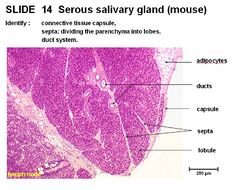Difference between revisions of "Serous Salivary Gland - Anatomy & Physiology"
Jump to navigation
Jump to search
m (Text replace - "Salivary Glands" to "Salivary Glands Anatomy & Physiology Flashcards") |
|||
| Line 7: | Line 7: | ||
<br> | <br> | ||
{{Template:Learning | {{Template:Learning | ||
| − | |flashcards= [[Salivary Glands Anatomy & Physiology Flashcards]] | + | |flashcards= [[Salivary Gland Anatomy & Physiology Flashcards|Salivary Glands Anatomy & Physiology Flashcards]] |
|powerpoints= [[Oral Cavity Histology resource|Oral Cavity Histology, see part 2 for salivary glands]] | |powerpoints= [[Oral Cavity Histology resource|Oral Cavity Histology, see part 2 for salivary glands]] | ||
}} | }} | ||
Revision as of 16:48, 31 August 2014
Overview
The serous salivary gland has a connective tissue capsule and septa dividing the parenchyma into lobes. There is a duct system. Interlobular ducts run in the tissue septum lined by cuboidal to columnar epithelium.
Intralobular ducts run within the lobules. Striated intralobular ducts are lined with cuboidal epithelium. Intercalated intralobular ducts are lined with low cuboidal to simple squamous epithelium. Serous acini secrete a watery solution rich in proteins with spherical nuclei. Cells are pyramidal, cuboidal or crescent shaped.
| Serous Salivary Gland - Anatomy & Physiology Learning Resources | |
|---|---|
 Test your knowledge using flashcard type questions |
Salivary Glands Anatomy & Physiology Flashcards |
 Selection of relevant PowerPoint tutorials |
Oral Cavity Histology, see part 2 for salivary glands |
